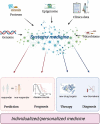Improving prediction of disease outcome for inflammatory bowel disease: progress through systems medicine
- PMID: 34142929
- PMCID: PMC8903817
- DOI: 10.1080/1744666X.2021.1945442
Improving prediction of disease outcome for inflammatory bowel disease: progress through systems medicine
Abstract
Introduction: Inflammatory bowel diseases (IBDs) are lifelong conditions causing relapsing inflammation of the intestine. In the absence of a cure, clinical management of IBDs is extremely challenging since they present with a wide range of phenotypes and disease behaviors. Hence, there is an urgent need for markers that could guide physicians in making the right choice of the rapidly growing treatment options toward a personalized care that could improve the overall outcome.Areas covered: In this review, the authors summarize existing biomarkers in IBD, discuss the challenges with the development of prognostic biomarkers and propose alternative options such as focusing on the prediction of the response to individual treatments, i.e. predictive biomarkers. The problems related to developing disease prognostic and predictive biomarkers in the field of IBDs are discussed including the difficulties in dealing with phenotypic heterogeneity particularly when performing studies in a real-life setting. The authors reviewed literature from PubMed.Expert opinion: Systems biology provides potential solutions to this problem by offering an unbiased, holistic approach to adjusting for variation in larger datasets thereby increasing the chances of identifying true associations between molecular profiles and clinical phenotypes.
Keywords: Inflammatory bowel diseases; multi-omics; personalized medicine; predictive biomarker; prognostic biomarker; systems biology.
Figures
References
-
- Burgess CJ, Henderson P, Jones GR, et al. Pediatric patients (less than age of 17 years) account for less than 1.5% of all prevalent inflammatory bowel disease cases. J Pediatr Gastroenterol Nutr. 2020. Oct;71(4):521–523. - PubMed
-
- Ghione S, Sarter H, Fumery M, et al. Dramatic increase in incidence of ulcerative colitis and Crohn’s disease (1988-2011): a population-Based study of french adolescents. Am J Gastroenterol. 2018. Feb;113(2):265–272. - PubMed
-
- Roberts SE, Thorne K, Thapar N, et al. A systematic review and meta-analysis of pediatric inflammatory bowel disease incidence and prevalence across Europe. J Crohns Colitis. 2020. Sep 7;14(8):1119–1148. - PubMed
Publication types
MeSH terms
Substances
Grants and funding
LinkOut - more resources
Full Text Sources


